How Well Does the QNAP TS-262 NAS Perform as a Plex Media Server?
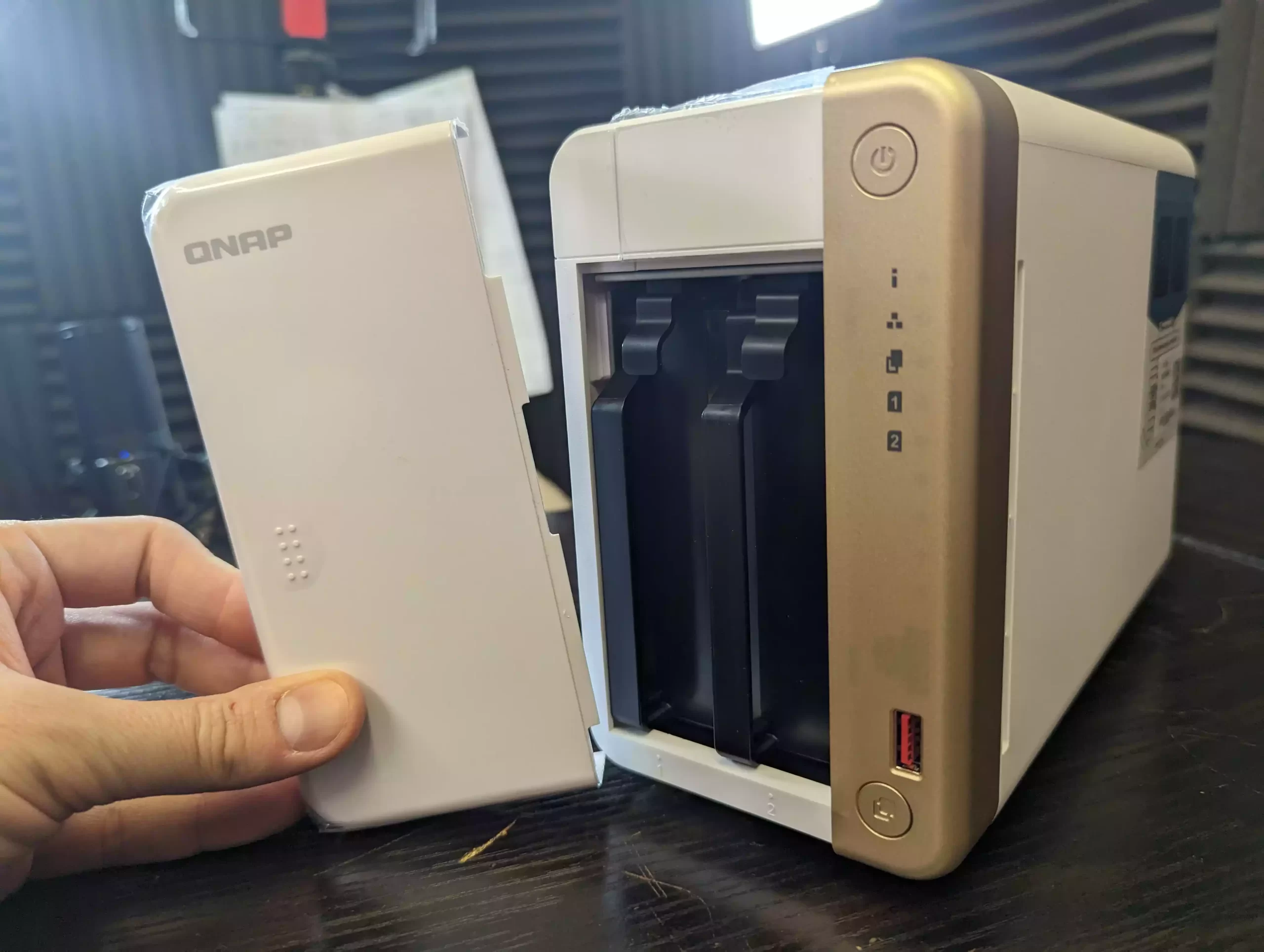
Is the QNAP TS-262 worth it as a Plex Media server NAS? A Plex Media Server NAS is a network-attached storage (NAS) device that has the software for the Plex Media Server application installed. The device acts as a central repository for all multimedia files, and the Plex application streams the content to connected client devices such as smartphones, tablets, and smart TVs. The attraction of having control over all your movies, TV shows, music, and personal videos, in the sleek and organized way popularized by streaming giants like Netflix, Disney+, and Prime Video, cannot be denied. With the rise of streaming platforms, however, comes the growing cost of monthly subscriptions and the uncertain ownership of the content. Even if you purchase digital movies or TV shows from online stores like Amazon Video, you still face the challenge of finding storage space and the risk of losing access if the platform loses its license. Having a Plex media server that offers a premium and accessible user interface, without the need for subscriptions, is a key reason why many home and prosumer users choose to invest in one. However, it’s important to note that not all NAS drives are created equal in terms of compatibility and performance with Plex. In this article, I will share my experience using the TS-262 NAS as a Plex media server, to help you make an informed decision on whether it’s worth storing your 4K multimedia content on it in 2023.
Note – If you are unfamiliar with the QNAP TS-262 NAS, but you want to learn more about it, what else it can do and whether it is good for more than just Plex, you can watch my video review below:
What is the Hardware of the QNAP TS-262 NAS Drive?
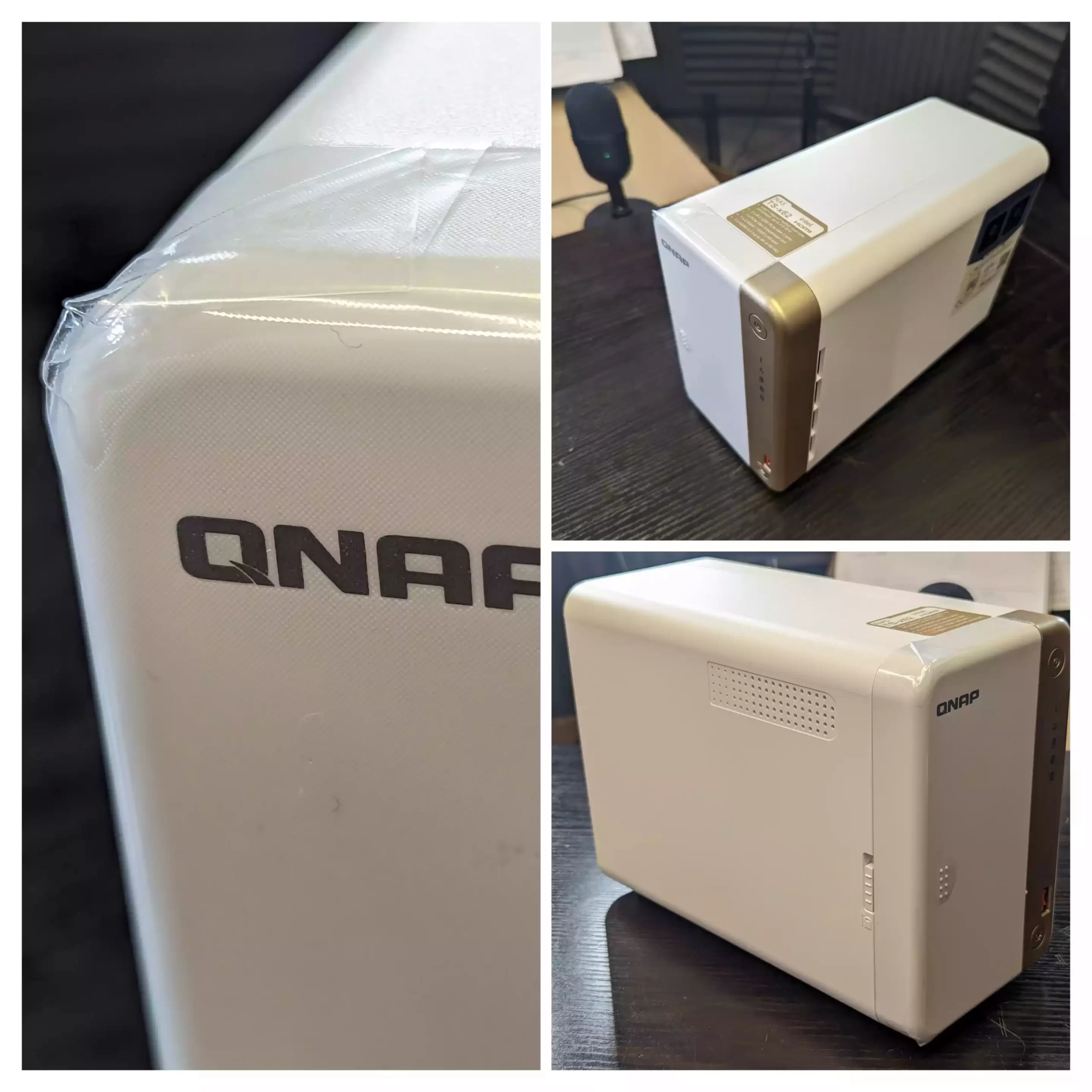
The QNAP TS-262 NAS drive is structurally similar to most personal computers and laptops, as it features a CPU, memory, and storage. However, it boasts components that are designed to be more energy-efficient and provide optimal performance for 24/7 usage, with a greater emphasis on storage-related applications. On the other hand, the hardware in a PC or laptop is geared towards running general applications, with storage services being relatively basic. The TS-262 NAS is equipped with a popular mid-range server CPU, DDR4 memory, and can accommodate both Hard Drives and SSDs using SATA connections. Although the specifications of QNAP NAS drives are not directly linked to Plex, it is important to understand the hardware specifications relevant to Plex when considering the TS-262 NAS. Below, I have compiled a list of the hardware specifications of the TS-262 that play a significant role in its compatibility and performance with Plex:
- CPU: Intel N4505 Dual Core 2.0-2.9Ghz
- Embedded Graphics: Yes, 350-700Mhz
- Memory (Quantity & Maximum): 4GB DDR4 (Max)
- Number of Storage Bays: Two
- M.2 NVMe Caching Bays: Two, M.2 NVMe PCIe Gen 3 x1
- Network Connectivity: 2.5GbE + PCIe Upgrade Slot
Next, let’s quickly touch on how we measure how good/bad the QNAP TS-262 NAS is for Plex Media Server.
Understanding the Plex Media Server Tests of the QNAP TS-262 NAS
![]()
Important Terms to Understand in Plex/NAS/Multimedia that will make the TS-262 NAS Plex Tests Easier to Understand.
- SD, 160p, 240p, 480p, 720p, 1080p, 4K : The resolution refers to the level of detail at which media is displayed, ranging from SD to 160p, 240p, 480p, 720p, 1080p, and 4K. The higher the resolution, the more pixels are present, which is determined by the quality of the original recording. Displaying high-resolution media, such as 1080p and 4K, puts a heavier load on the NAS hardware. NAS devices with limited graphics capabilities or no graphics at all may struggle to play 4K media seamlessly or not play it at all. It’s important to keep in mind that just because a NAS brand, such as QNAP, claims that their latest NAS is capable of natively playing 1080p or 4K media (natively meaning through their own software, client tools, and/or DLNA), this does not guarantee that the TS-262 NAS will perform the same way with Plex. As Plex is a third-party tool, it may have different requirements and limitations.
- Transcoding, Encoding, Decoding: Transcoding, encoding, and decoding are various terms used when a media file needs to be transformed to be better suited for a specific device, internet connection, or hardware. When accessing media locally, transcoding may not be necessary, unless your files are mainly H.265/HEVC based. However, when accessing media from remote locations with limited bandwidth, weaker internet connection, or smaller devices, you may want to access the media in lower quality. This is where transcoding, or real-time encoding, comes in handy. Keep in mind that transcoding is one of the most demanding tasks for a NAS. To utilize the full resources of the NAS CPU, including its embedded graphics, you may need to enable the “Make My CPU Hurt” option in the encoder menu of the Plex NAS settings menu, which may require a Plex Pass subscription depending on the NAS.
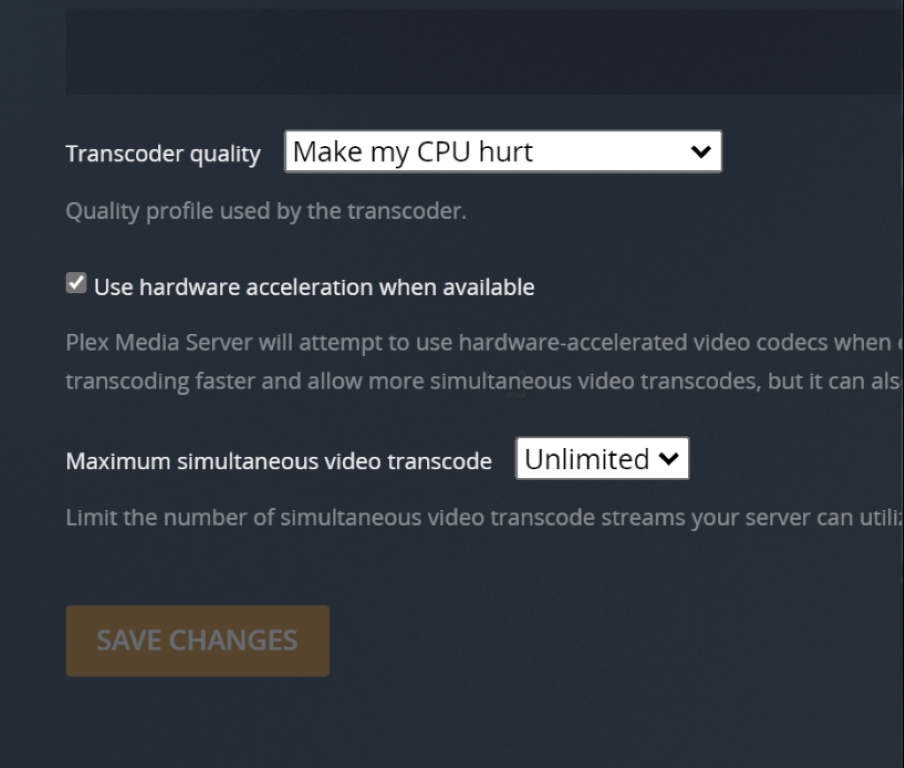
- H.264, HEVC, H.265: The compression techniques H.264, HEVC, and H.265 are used to make large media presentations suitable for viewing on home devices. While H.264 is widely supported by all devices, not all have permission or a license to play H.265/HEVC, as the licensing and patents for H.265/HEVC are complex, expensive, and spread across multiple providers. This can lead to the need for automatic conversion/transcoding of H.265/HEVC media into H.264, which consumes more system resources. The QNAP NAS drive, like the rest of the QNAP NAS range, does not come with HEVC support by default.
- Bitrate:Bitrate refers to the quantity of data that is processed per unit of time, typically expressed in megabits per second (Mbps) for video and kilobits per second (kbps) for audio. The higher the bitrate, the better the quality and resolution of the media tends to be.
For more information on the most important terms to understand when discussing/researching a NAS as a Plex Media Server can be found in my video below:
If you have any further questions, you can use the free advice section at the bottom of the page and ask Eddie and me directly.
How was the QNAP TS-262 NAS Tested in Plex?
The setup for testing the TS-262 NAS for Plex was as follows:
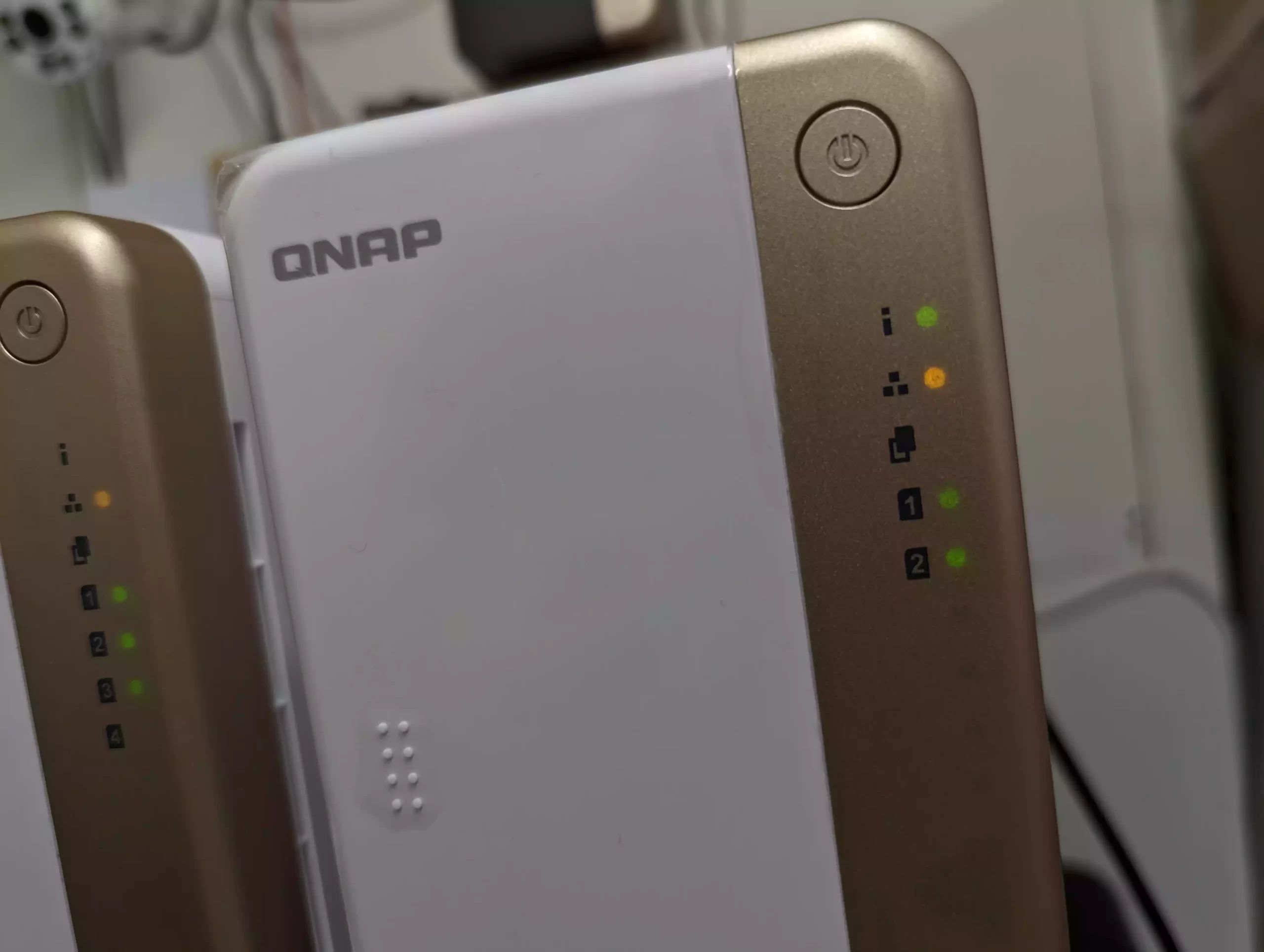
- The QNAP TS-262 NAS was accessed over a 1GbE network, however in order to test how the NAS would cope with transcoding/encoding, I would force the Plex Player client to transcode the file manually
- The TS-262 NAS was used in the default CPU+Memory state that the base model arrives in (no upgraded memory or upgraded caching media)
- Tests were performed one after the other with a short break between each test, so you might see the tail end of the previous test on a CPU graph, but I have pointed at the are of the % utilization that is important as per each test.
CLEAR PASS indicates successful file playback with enough resources for the NAS to handle other tasks, while PLAYED BUT HIGH CPU % signifies that the file played, but consumed significant system resources. FAIL AND-OR DID NOT PLAY means the file did not play or playback was choppy. To view the full video of the Plex tests performed on the QNAP TS-262 NAS, watch the video below (warning: long). Or, you can scroll down to see individual test results and which ones succeeded and which ones failed.
What % System Resources did the QNAP TS-262 NAS Use in Plex when Idle?
The Plex Media Server app requires a portion of system resources even when not playing multimedia, to ensure quick playback from the QNAP NAS when requested remotely. While 2 cores and 2GB of memory are ideal for best performance, some NAS also reserve resources for system use. Knowing the amount of system resources consumed by the QNAP TS-262 NAS when Plex is idle can provide insight into available power for playback. Here’s a screenshot of the TS-262 when Plex is running but no media is being accessed.
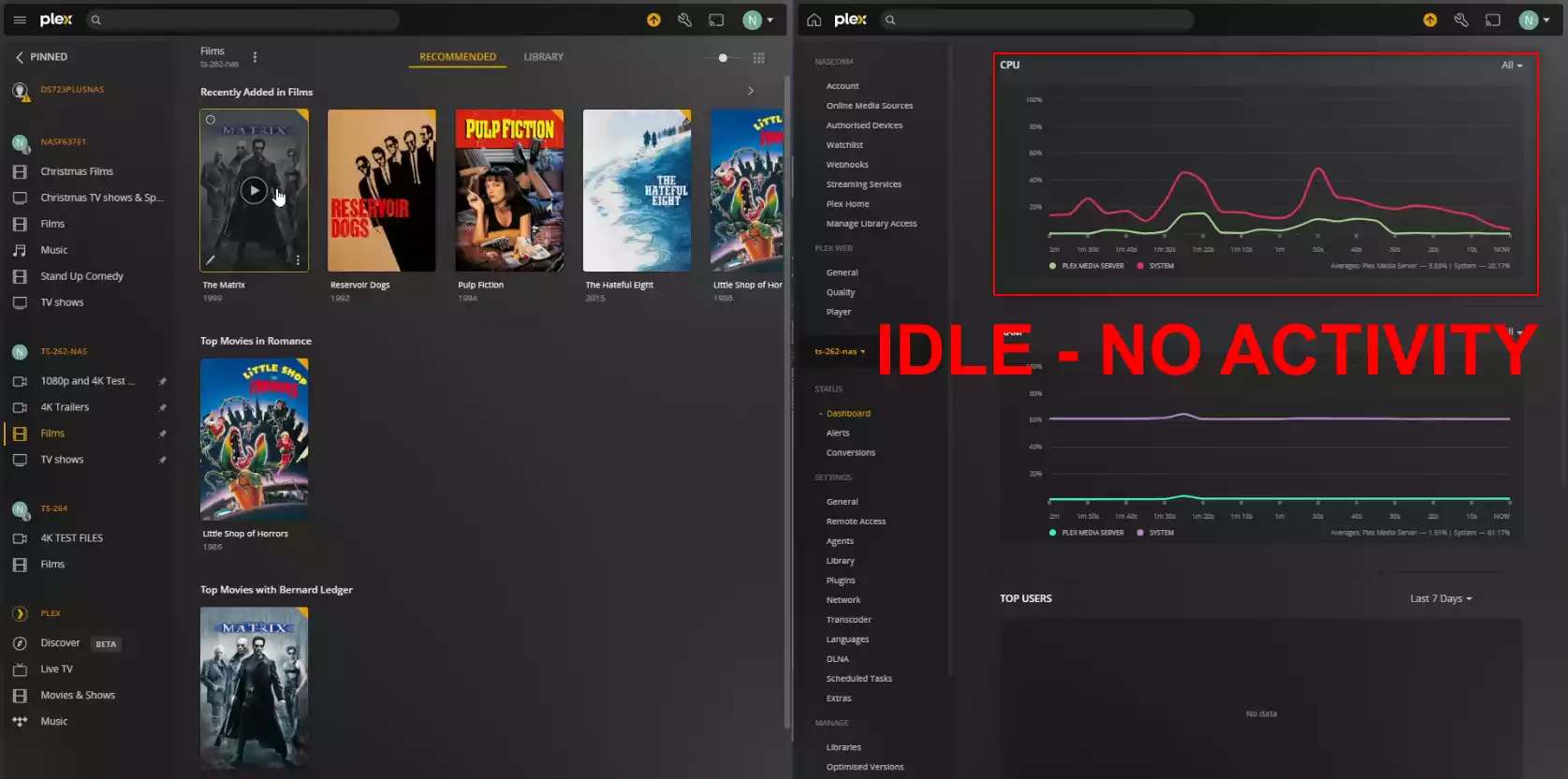
Plex Test 1 – QNAP TS-262 NAS Plex Test – UHD 4K H.265 HEVC 10bit 16Mbps MKV
Here is how the QNAP TS-262 NAS Plex Test – UHD 4K H.265 HEVC 10bit 16Mbps MKV File Performed:
RESULT: CLEAR PASS
Extra Notes: None
Plex Test 2 – QNAP TS-262 NAS Plex Test – IMAX 4K UHD 2160p 40Mbps MKV
Here is how the QNAP TS-262 NAS Plex Test – IMAX 4K UHD 2160p 40Mbps MKV File Performed:
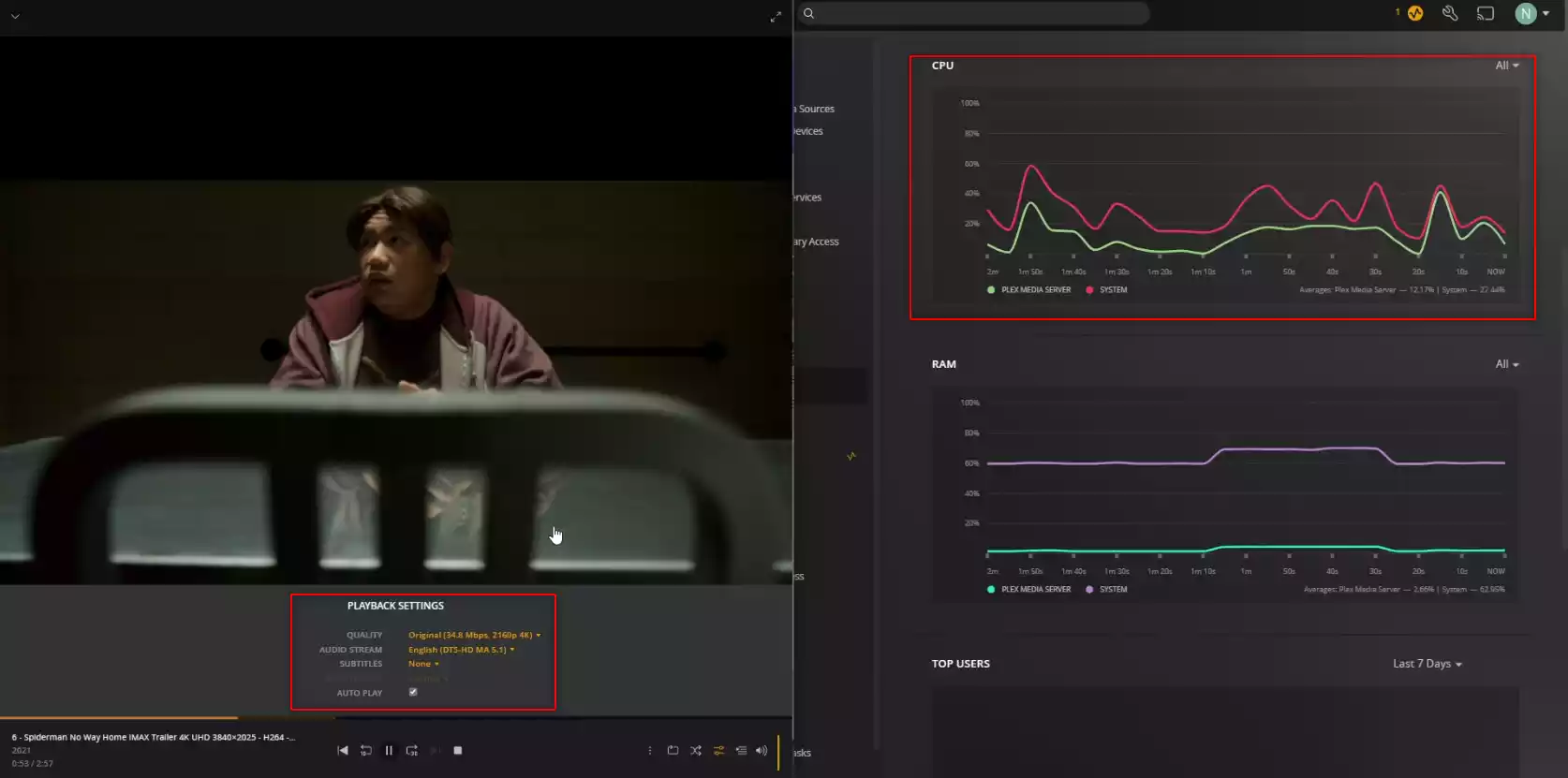
RESULT: CLEAR PASS
Extra Notes: None
Plex Test 3 – QNAP TS-262 NAS Plex Test – IMAX 4K H.264 10bit 80Mbps MKV
Here is how the QNAP TS-262 NAS Plex Test – IMAX 4K H.264 10bit 80Mbps MKV File Performed:
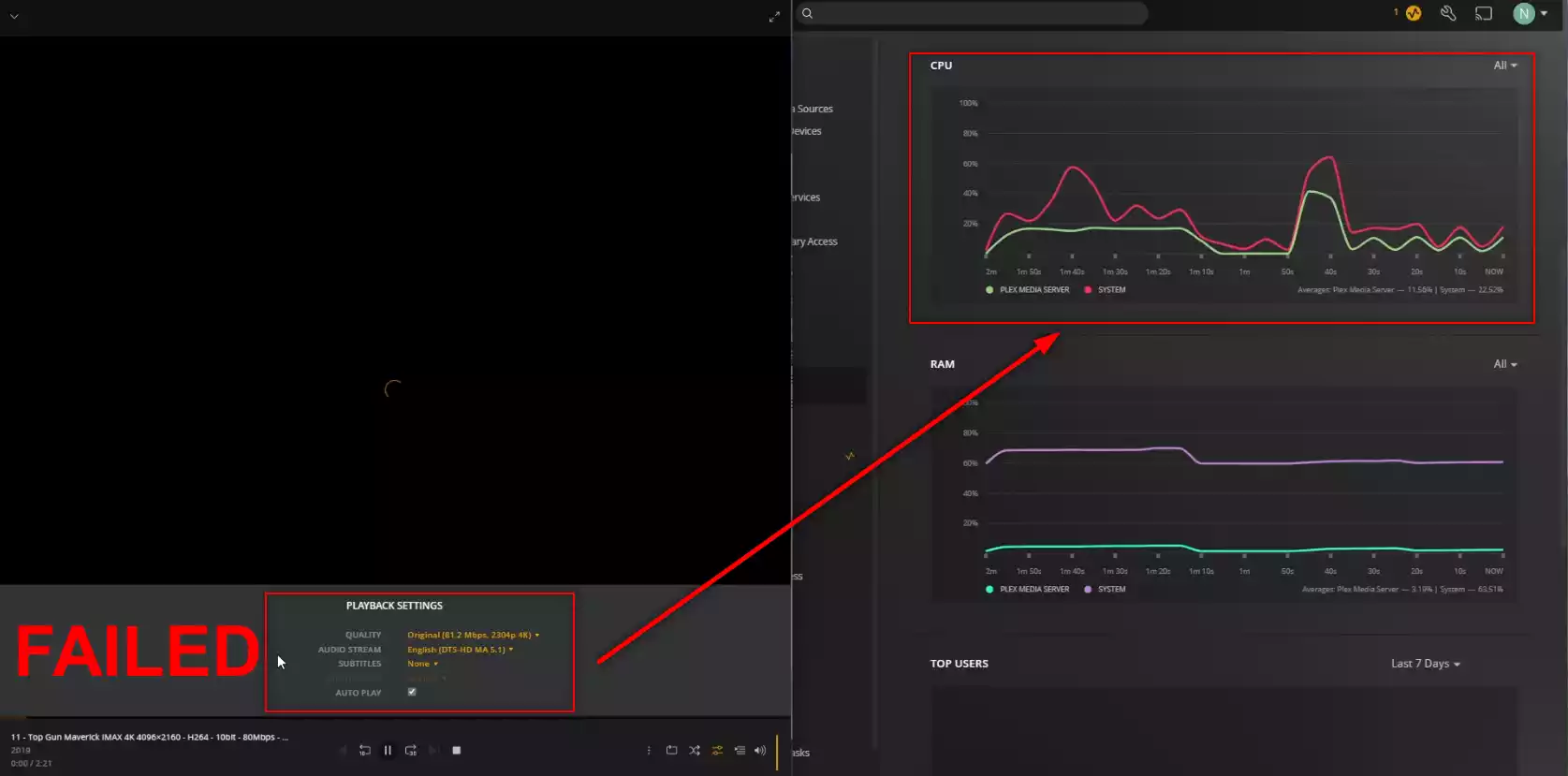
RESULT: FAIL AND-OR DID NOT PLAY
Extra Notes: None
Plex Test 4 – QNAP TS-262 NAS Plex Test – 4K H.264 8bit 16Mbps MP4
Here is how the QNAP TS-262 NAS Plex Test – 4K H.264 8bit 16Mbps MP4 File Performed:
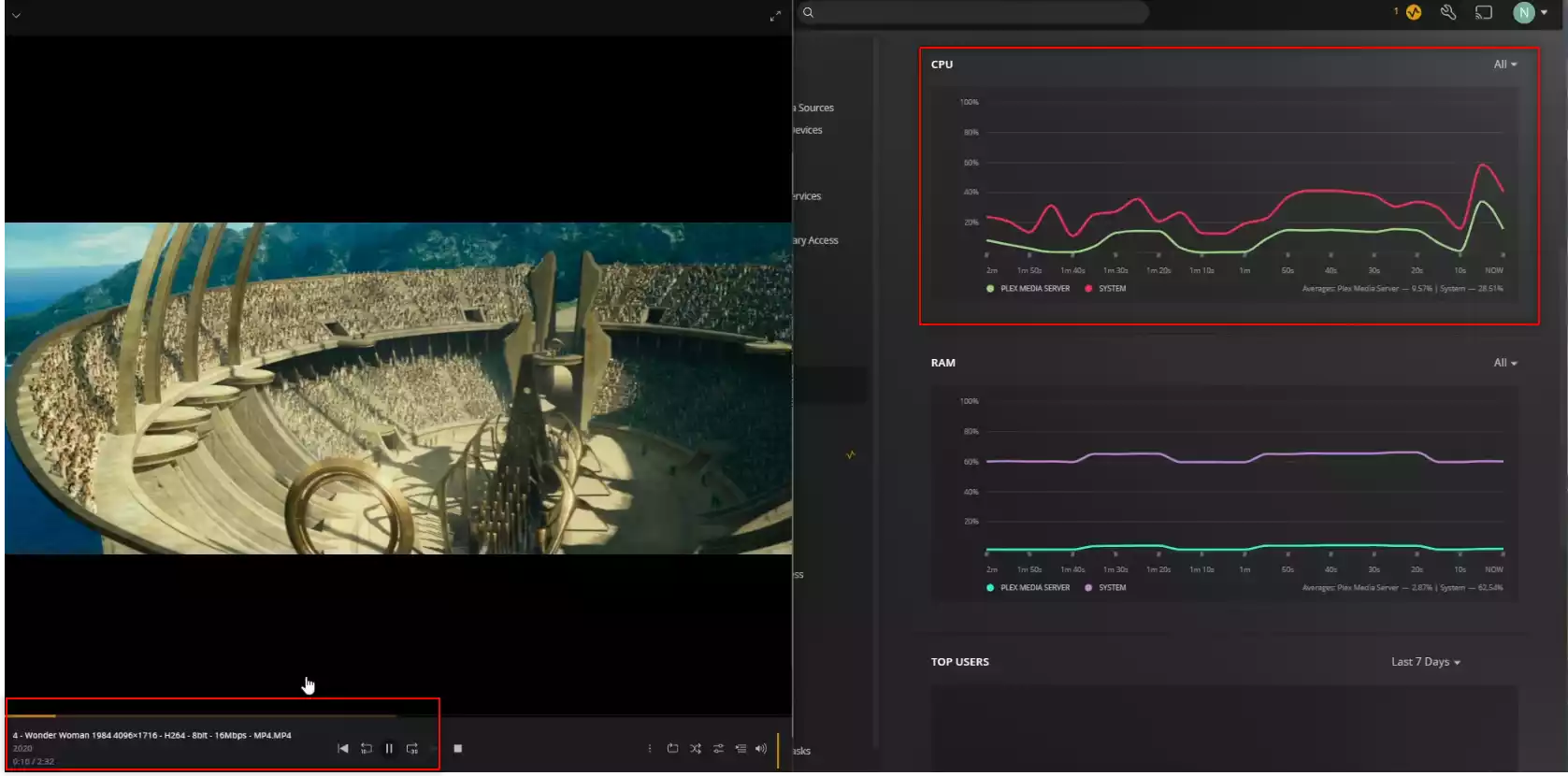
RESULT: PLAYED BUT MEDIUM CPU %
Extra Notes: None
Plex Test 5 – QNAP TS-262 NAS Plex Test – 4K UHD HEVC h.265 8bit 60Mbps MKV
Here is how the QNAP TS-262 NAS Plex Test – 4k uhd hevc h.265 8bit 60Mbps MKV File Performed:
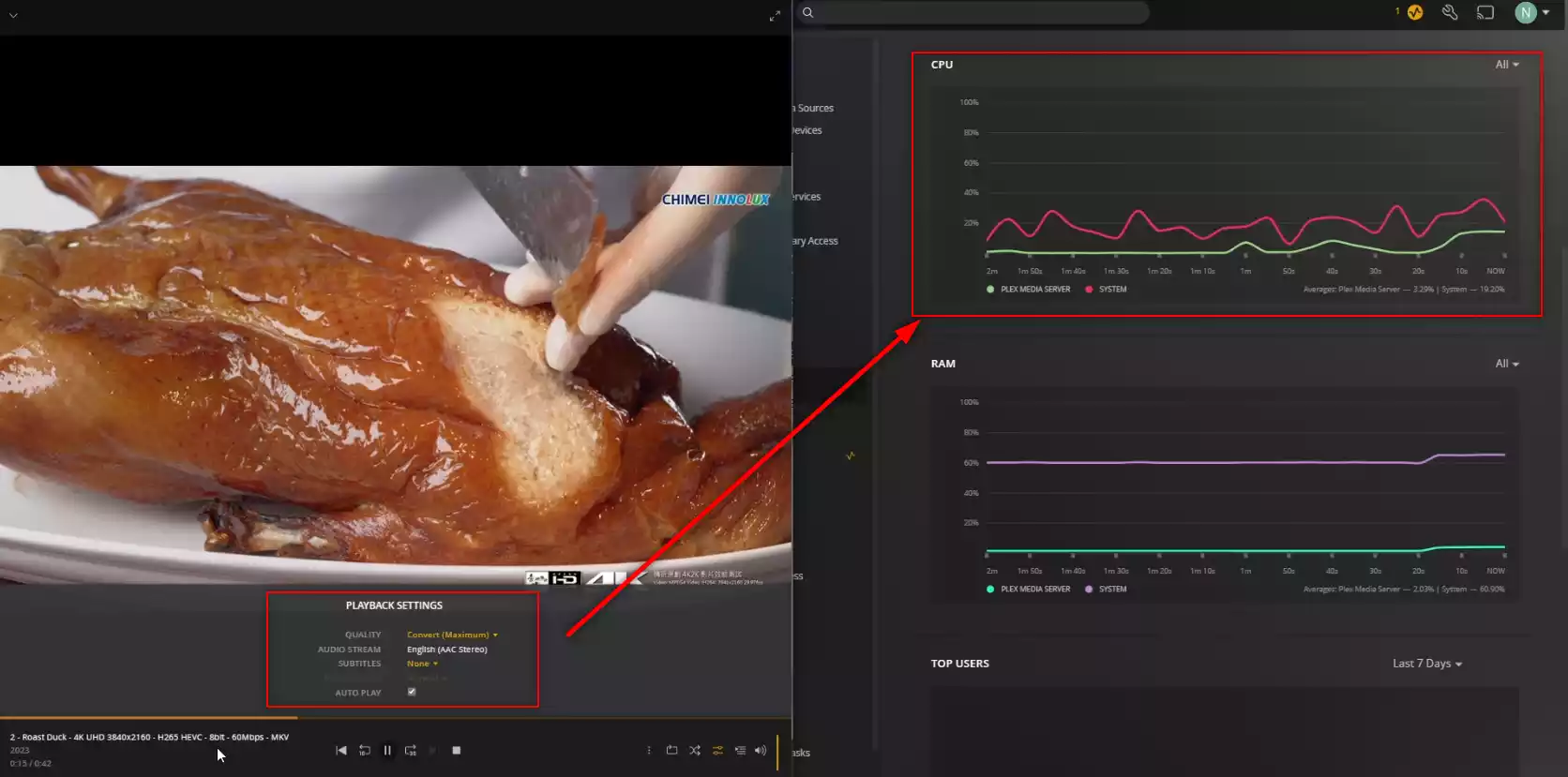
RESULT: CLEAR PASS
Extra Notes: None
Plex Test 6 – QNAP TS-262 NAS Plex Test – 4K UHD HEVC h.265 8bit 30Mbps MKV
Here is how the QNAP TS-262 NAS Plex Test – 4k uhd hevc h.265 8bit 30Mbps MKV File Performed:
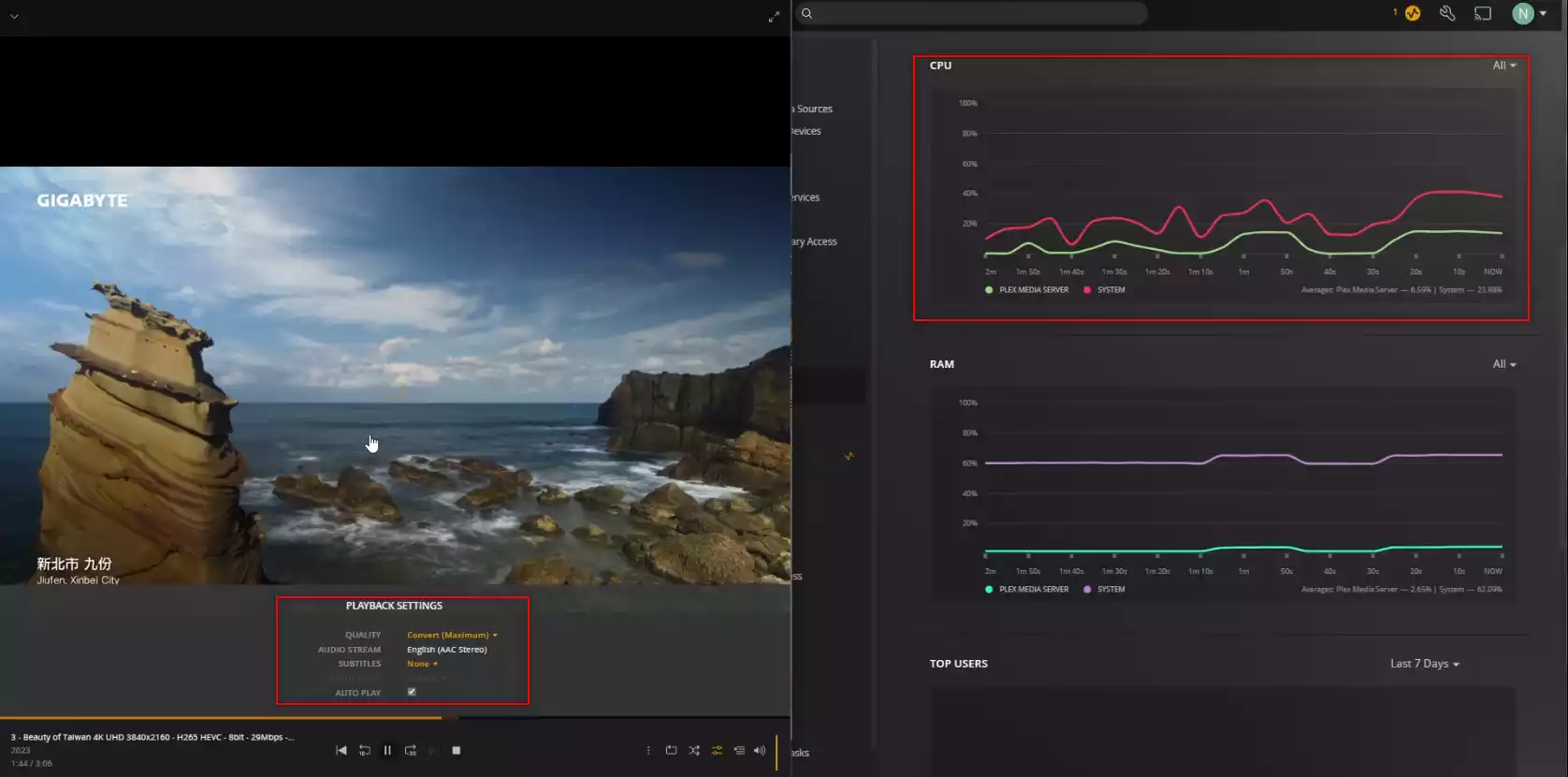
RESULT: CLEAR PASS
Extra Notes: None
Plex Test 7 – QNAP TS-262 NAS Plex Test – 4K UHD H.265 HEVC 60Mbps MKV
Here is how the QNAP TS-262 NAS Plex Test – 4K UHD H.265 HEVC 60Mbps MKV File Performed:
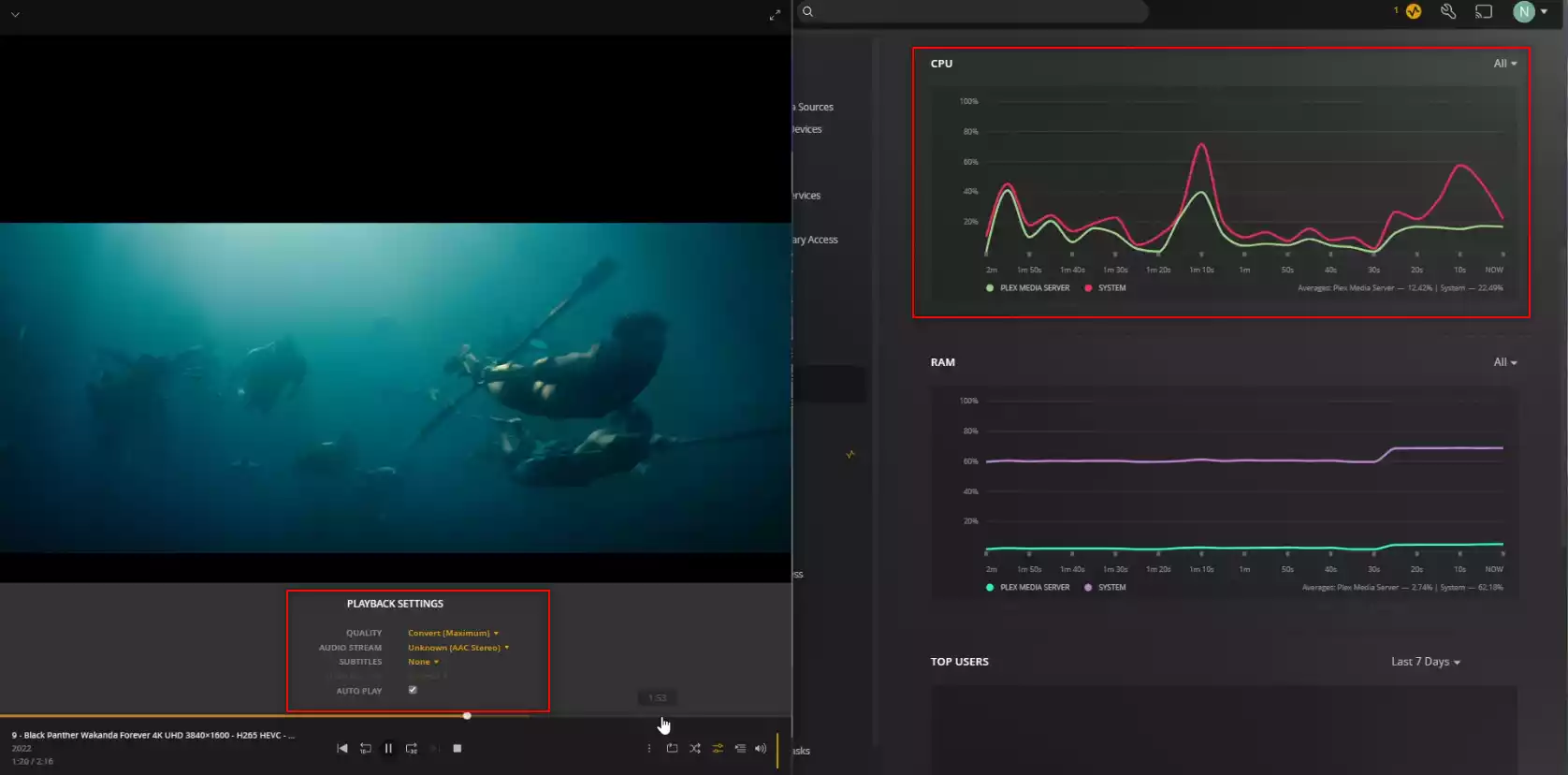
RESULT: PLAYED BUT HIGH CPU %
Extra Notes: None
Plex Test 8 – QNAP TS-262 NAS Plex Test – 4K H.264 12Mbps 24FPS MP4
Here is how the QNAP TS-262 NAS Plex Test – 4K H.264 12Mbps 24FPS MP4 File Performed:
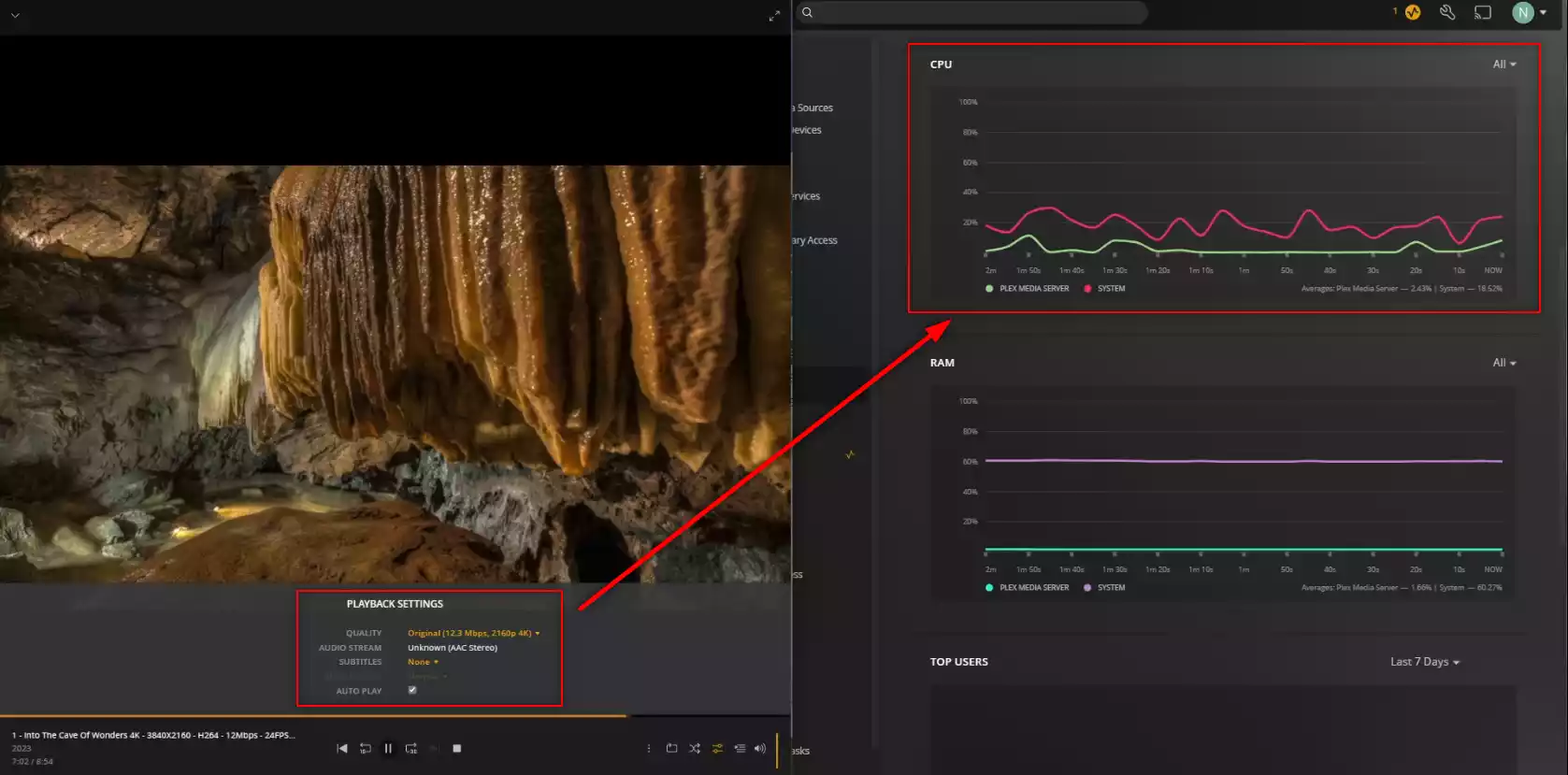
RESULT: CLEAR PASS
Extra Notes: None
Plex Test 9 – QNAP TS-262 NAS Plex Test – 4K H.264 8bit 32Mbps MKV
Here is how the QNAP TS-262 NAS Plex Test – 4K H.264 8bit 32Mbps MKV File Performed:
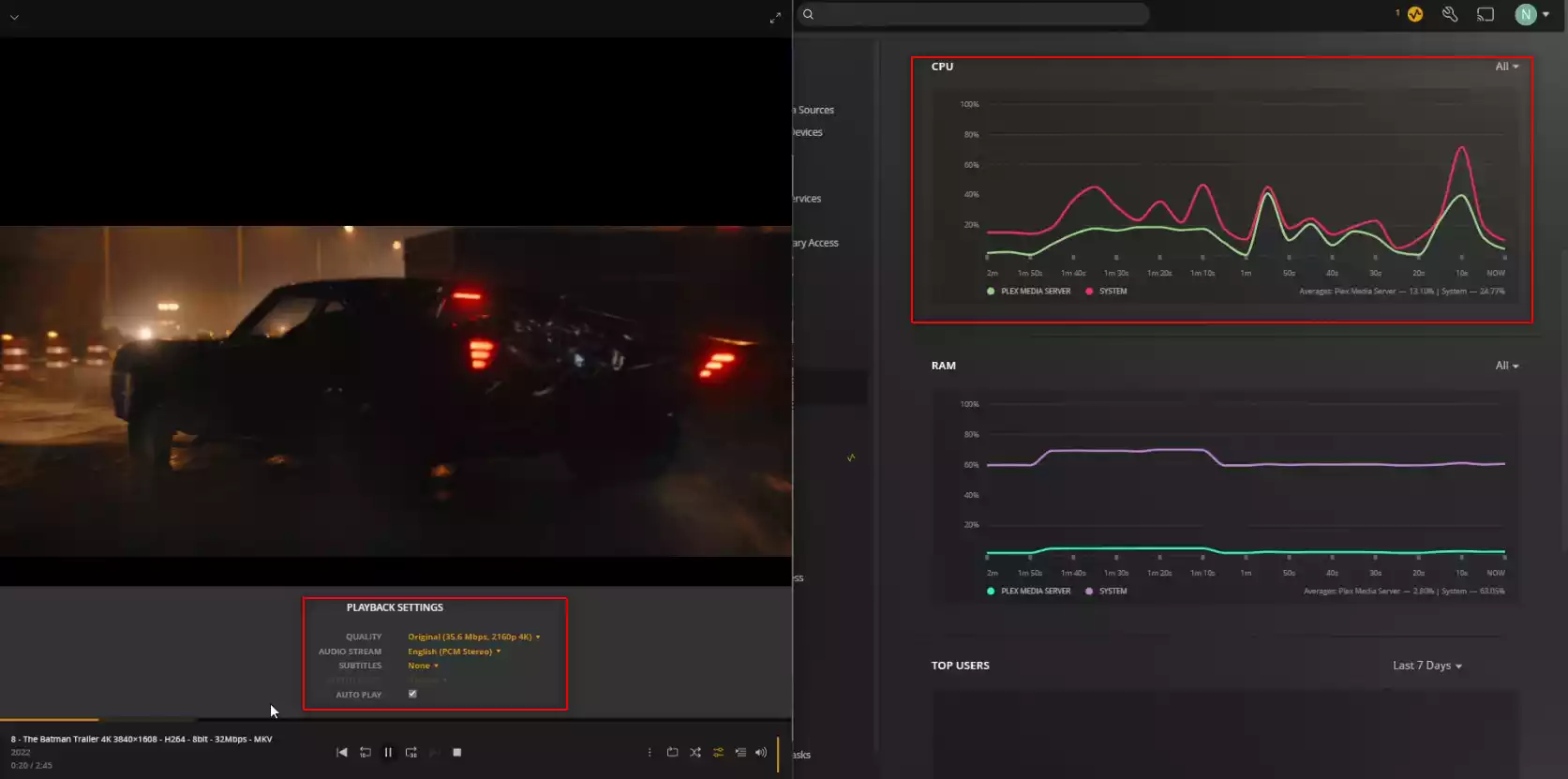
RESULT: PLAYED BUT MEDIUM CPU %
Extra Notes: None
Plex Test 10 – QNAP TS-262 NAS Plex Test – 1080p 2Mbps MP4
Here is how the QNAP TS-262 NAS Plex Test – 1080p 2Mbps MP4 File Performed
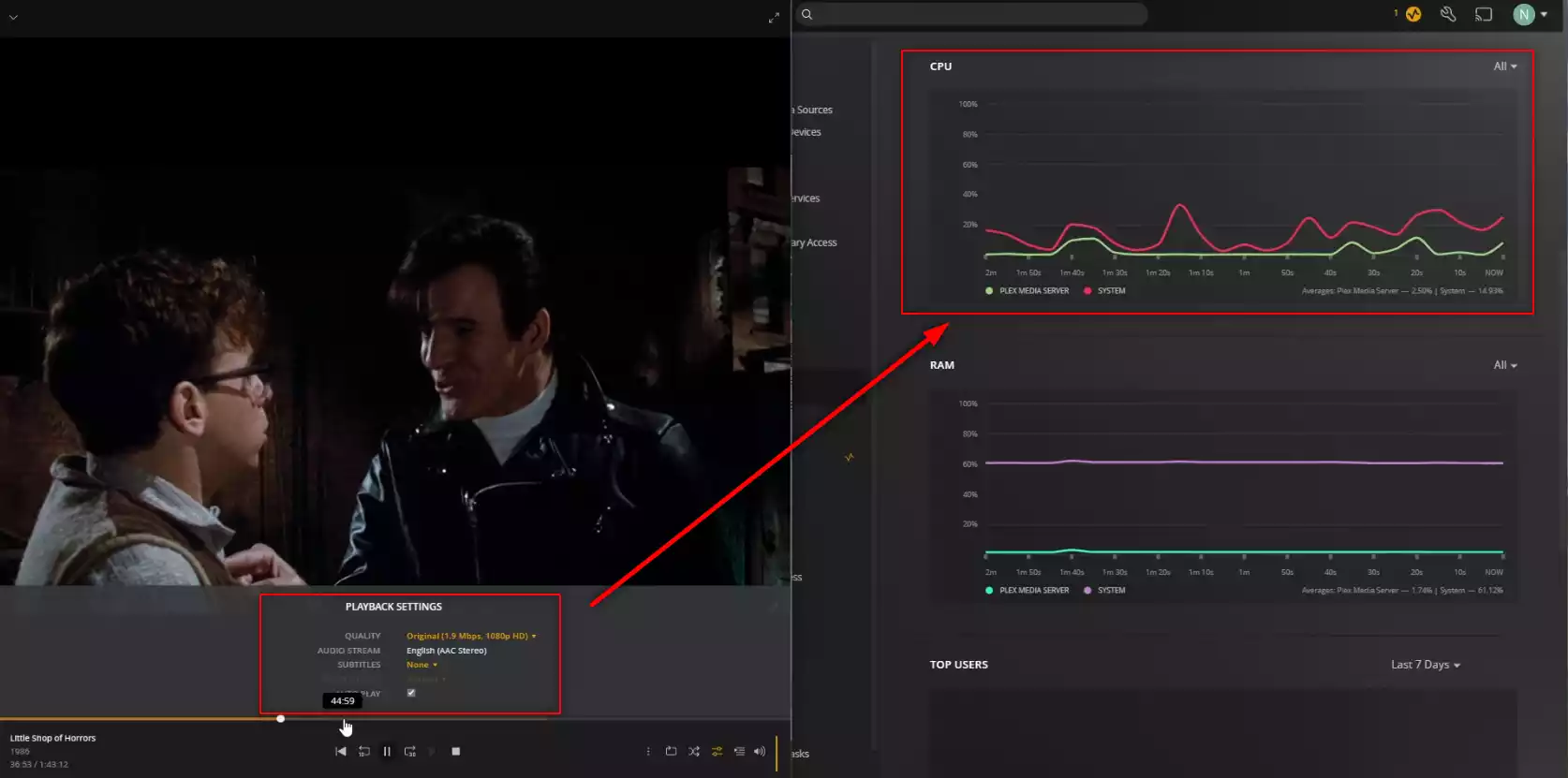
RESULT: CLEAR PASS
Extra Notes: None
Plex Test 11 – QNAP TS-262 NAS Plex Test – 720p 0.7Mbps MP4
Here is how the QNAP TS-262 NAS Plex Test – 720p 0.7Mbps MP4 File Performed:
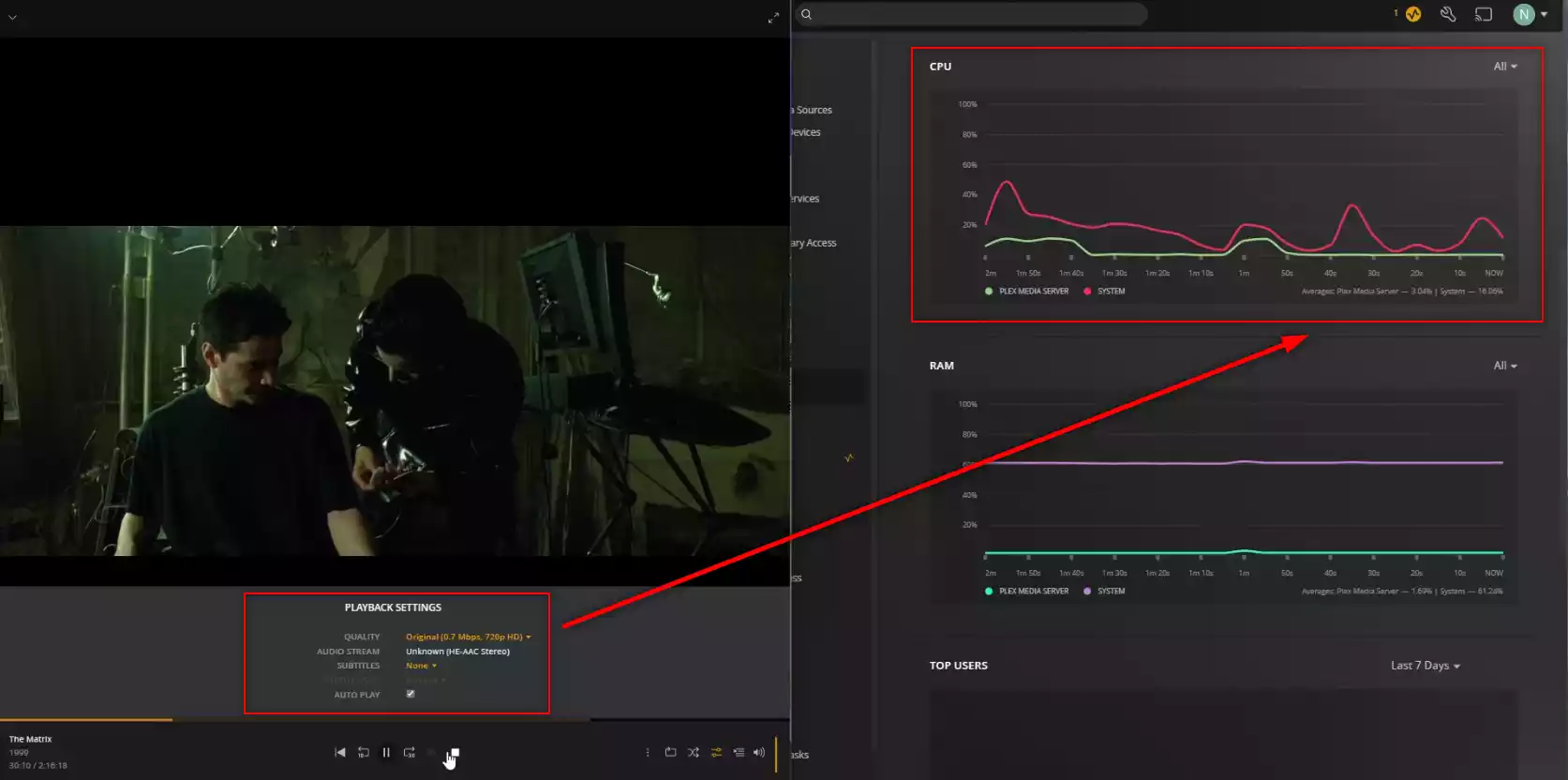
RESULT: CLEAR PASS
Extra Notes: None
Is the QNAP TS-262 NAS Any Good outside of Plex and Where Can I buy It?
If you are interested in learning more about the QNAP TS-262 NAS Drive, I am pleased to confirm that the review here on NASCompares is already live and you can find out more about this device below.
Quick Verdict of the QNAP TS-262 NAS – What We Said in the TS-262 Review:
The QNAP TS-262 NAS is a substantial update on the QNAP TS-251+D (even worth considering for those who opted for the TS-251+D or TS-251+B previously) that features a more modern CPU that allows increased internal performance. This translates in hardware to M.2 NVMe SSD support, a larger bandwidth PCIe Upgrade slot, USB 3.2 Gen 2 10Gb/s connectivity and 2.5GbE by default. Some areas of the device are less compelling, such as that fixed 4GB of memory meaning that the price needs to reflect the extra RAM on day 1, but you also cannot scale that extra memory further as your processes grow years from now. The limiting of those M.2 NVMe SSD bays to PCIe Gen 3×1 makes alot of sense, giving the range of this PCIe3 Celeron CPU makes sense, but is nonetheless going to annoy some users. lastly, the hardware gains in the system featuring much, MUCH more powerful and visually appealing HDMI 2.1 is a fraction let down by the HD Station software getting fewer and fewer feature-rich updates (outside of stability and performance fixes). As far as running the QNAP QTS EXT4 software platform on the TS-262, you will have little to no complaints, as it can run the bulk of the 1st/3rd party applications available to the software, just remember that you are running a dual-core and two thread processor – so the glass ceiling in terms of hardware resources is going to be a pinch lower than some of their Pentium, Intel Core or Xeon systems of course. After a bumpy start to 2022, with the brand needing to win alot of users back after being targetted by ransomware groups and missteps in communication, fast forward to the start of 2023 and you have a much more secure, closed and layered QNAP NAS platform here.
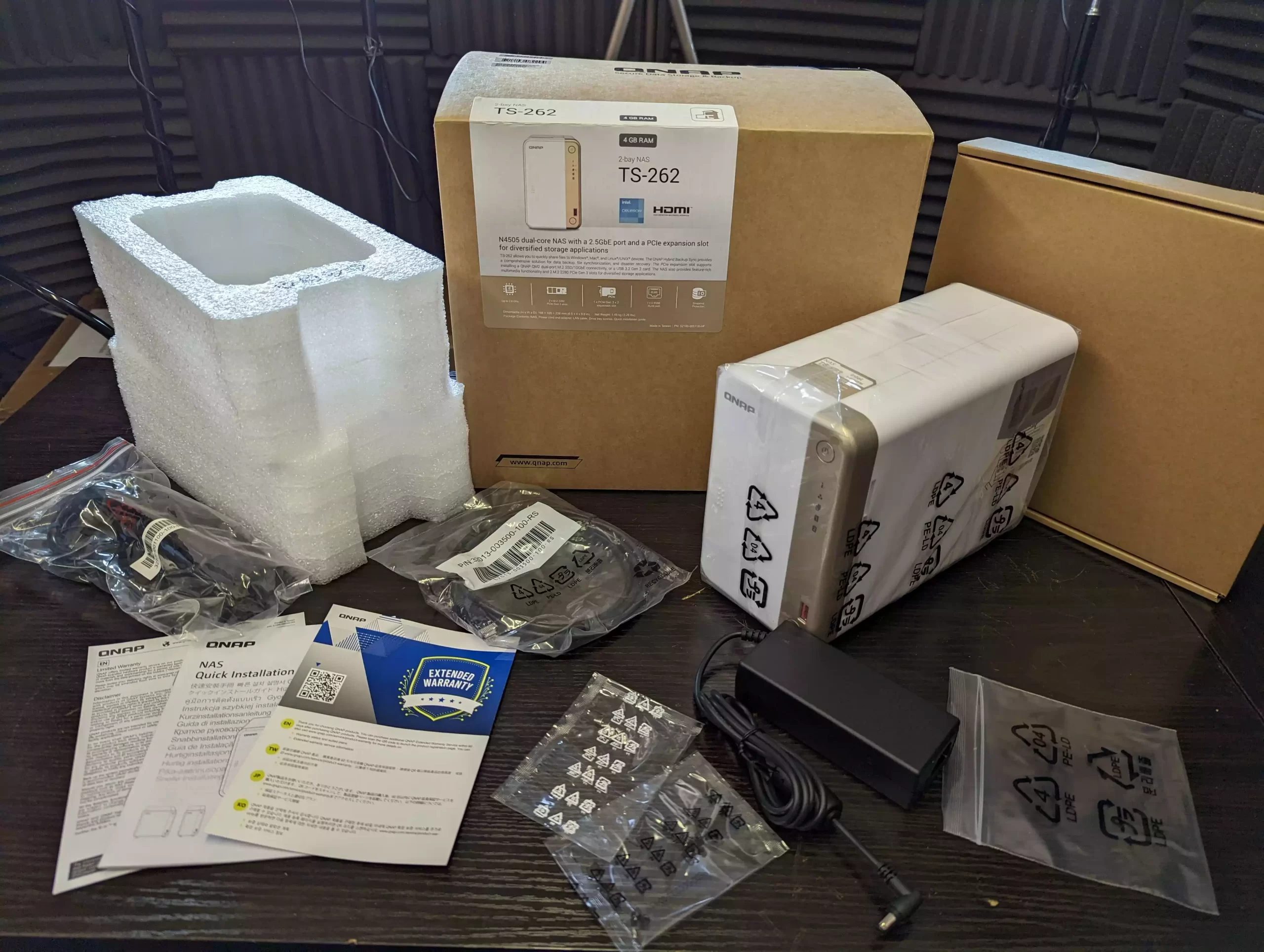
Choosing the QNAP TS-262 NAS over the increasing range of 2-Bay’s in the brand’s portfolio is a little less straightforward, with the TS-262 nestled somewhere between the TS-253E, TS-264, HS-264 and TS-364 (with several more 2-Bay options in the TS-x51+, TS-31P3 AND TS-31K still listed on their official site). I also think the TS-262 would do better to have been released alongside the TS-264 (and the rest of the x64 range), when the portfolio was a little less clustered and its status as an affordable alternative to the TS-262 made alot more sense! The QNAP TS-262 is designed for users looking to spend a little less on base hardware, whilst still buying a device that can be scaled in storage, network bandwidth and more down the line. QTS still continues to be fully featured and has a great many new security and access defaults/settings introduced to limit novice users leaving doors open, but still has a fractionally steeper learning curve than many of its competitors, often trying to do too many things at once (or at least not stopping an end user doing too much at times), which can lead to occasionally bumps in the road when using their platform on a more modest system as this. The QNAP TS-262 is a great 2-Bay NAS and a solid refresh/update on the TS-251D, but if you can stretch your budget a fraction more, I recommend opting for the TS-462 or TS-264 ($100-200 more) as much like this device doubles down on it’s predecessor hardware, so do those two NAS ram things up further for your money. A good NAS indeed, that lives a tad in the shadow of it’s own brothers and sisters!
Read the Rest of the Review HERE. Alternatively, you can find out the Pros and Cons below, as a few retailers that sell the QNAP TS-262 NAS. Thanks for reading and if you need any further help choosing the right NAS for your Plex Media Server, use the free advice section linked below. Have a great week.
Where to Buy a Product





![]()
![]()

VISIT RETAILER ➤






![]()
![]()

VISIT RETAILER ➤
📧 SUBSCRIBE TO OUR NEWSLETTER 🔔
🔒 Join Inner Circle
Get an alert every time something gets added to this specific article!
This description contains links to Amazon. These links will take you to some of the products mentioned in today's content. As an Amazon Associate, I earn from qualifying purchases. Visit the NASCompares Deal Finder to find the best place to buy this device in your region, based on Service, Support and Reputation - Just Search for your NAS Drive in the Box Below
Need Advice on Data Storage from an Expert?
Finally, for free advice about your setup, just leave a message in the comments below here at NASCompares.com and we will get back to you. Need Help?
Where possible (and where appropriate) please provide as much information about your requirements, as then I can arrange the best answer and solution to your needs. Do not worry about your e-mail address being required, it will NOT be used in a mailing list and will NOT be used in any way other than to respond to your enquiry.
Need Help?
Where possible (and where appropriate) please provide as much information about your requirements, as then I can arrange the best answer and solution to your needs. Do not worry about your e-mail address being required, it will NOT be used in a mailing list and will NOT be used in any way other than to respond to your enquiry.

|
 |
WHERE IS SYNOLOGY DSM 8? and DO YOU CARE? (RAID Room)
UniFi Routers vs OpenWRT DIY Routers - Which Should You Choose?
WHY IS PLEX A BIT S#!t NOW? IS 2026 JELLYFIN TIME? (RAID Room)
Synology FS200T NAS is STILL COMING... But... WHY?
Gl.iNet vs UniFi Travel Routers - Which Should You Buy?
UnifyDrive UP6 Mobile NAS Review
Access content via Patreon or KO-FI
Discover more from NAS Compares
Subscribe to get the latest posts sent to your email.


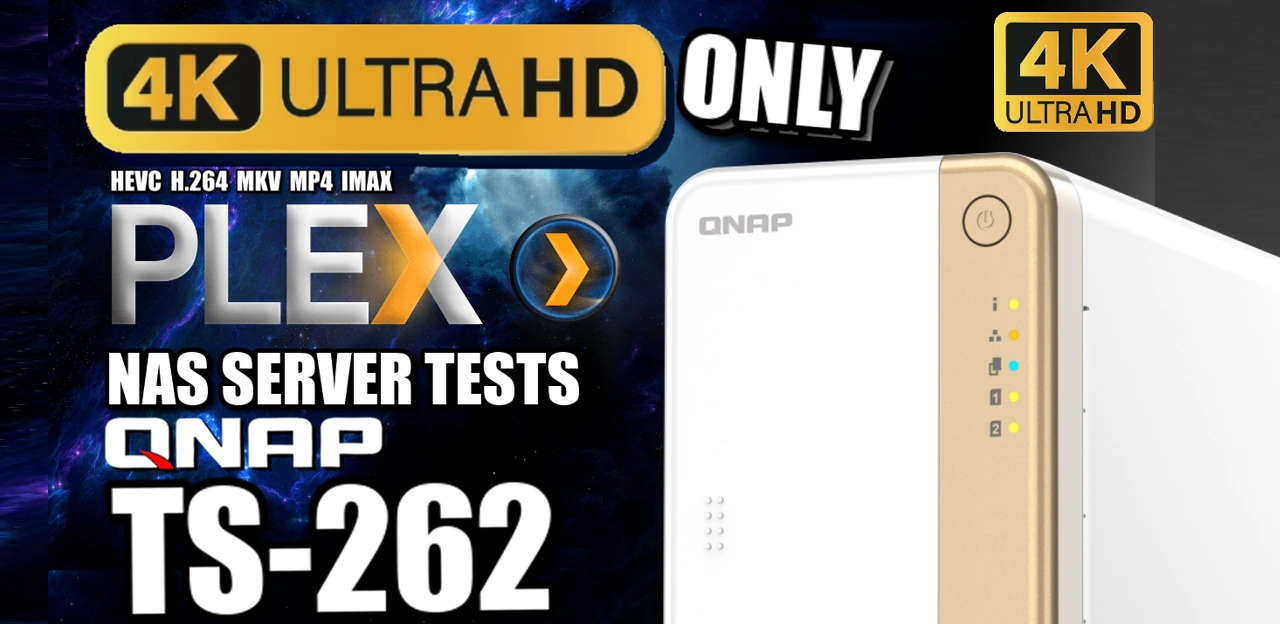
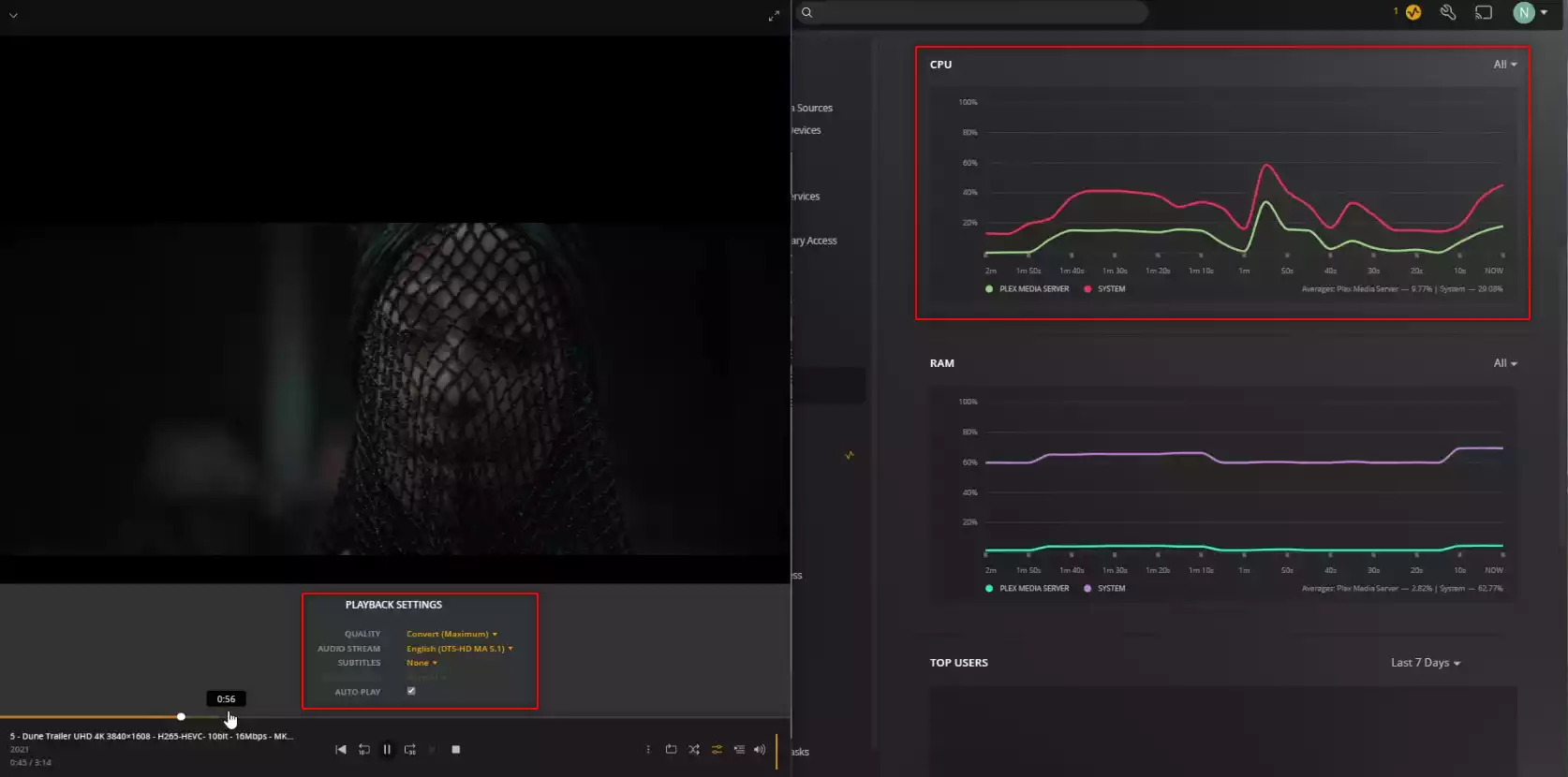



Might be a silly question.
If I were to install a hard disk which was previously in my ASUStor AS4002T is there any chance the data would be readable? My ASUStor NAS has died. The HDD may also be dead, IDK.
I am reluctant to buy another ASUStor but if I did it is more likely that the old HD can be read again? The AS4002T is obselete, but I note that the AS5202T can be found on Amazon for £239. I know it’s an old product and I would prefer something newer.
REPLY ON YOUTUBE
RAM is no longer soldered in on these TS-262 units. I just bought one and swapped the 4GB out for 2 x 8gb sticks and now have 16GB of RAM.
REPLY ON YOUTUBE
I know it’s a bit late but… just to let you know I just bought this NAS and it has 2 memory slot (DDR4) and it’s fully upgradable to 32 Gbyte.. (despite what QNAP says). I’m currently use this NAS with 2x Hitachi 10 TB in RAID 1 with 2x M2 1TB as read and write cache disk and memory expanded to 32 GB. It works like a dream… I think it’s currently one of the best choice on the market (paid £279 on amazon).
REPLY ON YOUTUBE
i only have media files like the last one (top gun).
what nas do i need for playing such huge mkv files?
REPLY ON YOUTUBE
I’ve just got a 262 and the RAM seems to be socketed with a vacant socket, so perhaps some of there production is actually upgradable.
REPLY ON YOUTUBE
The new TS-262 version comes with 2 RAM Slots, it includes 1x4Gb stick and it has a second slot to update the RAM, I just added 4Gb more. Interesting thing, I couldn’t find information about that new version or RAM compatibility. Neither on QNAPs website.
REPLY ON YOUTUBE
Would this be a good nas for a zappiti or zidoo?
REPLY ON YOUTUBE
In my case i play content on an AppleTV4K, so is my appleTV doing the heavy transcoding? Meaning that in my case doesn’t really matter if the NAS has enough processing power or not?
REPLY ON YOUTUBE
HDMI 2.1 or HDMI 2.0?
REPLY ON YOUTUBE
How many devices can watch 4k at same time on nas?
Keep up great content
REPLY ON YOUTUBE
So would the ts-462 be able to play the last file since you mentioned a 4 bay would be better?
REPLY ON YOUTUBE
Was this with hardware transcoding enabled or disabled?
Shame it’s only dual-core
REPLY ON YOUTUBE
Thks;
I stills-gots-hopes on the DS223+ buts it seems-likes Synology is giving the fun/home NAS market-share to QNAP on a silver-platter. Hey, ?Where in the heck is the seagull/Eddie? Wait-a-minute ….. yous-means the seagull is really Eddie in disguise (!Conspiracy !;)
REPLY ON YOUTUBE
I try to watch every review you do, they are great and hopefully within six months I can finally purchase my first NAS, most likely a QNAP devise. Cheers from the States 🙂 – wright
REPLY ON YOUTUBE
Plex test the 6 bay from asustor
REPLY ON YOUTUBE
How about 8k? Anyone buying these for media like movies likely has the dough for 8k and that would be a more beneficial test.
REPLY ON YOUTUBE
Thanks!
Not bad for what it gives.
REPLY ON YOUTUBE
can’t upgrade ram ? from 4 gb? i think is not enough.
REPLY ON YOUTUBE
why don’t you include read/write speed tests with the most common NAS commercial disks like RED’s or Ironwolfs? Just to see what the equipment/OS is capable of handling? Having a comparison of filesystems supported by the NAS be it ZFS or EXT4 etc etc comes down to write speeds / (parity) hardware bottlenecks. All in it’s own grandure should be included in reviews no?
REPLY ON YOUTUBE
Thanks you for your video review.
REPLY ON YOUTUBE
as usual, PERFECT review – explanation of each part and things of the nas, too bad the ram is solded, and basically they force you to have that only, with my 251-d i run 32 gb full of virtual machines, containers, and applications such as jellyfin and more
REPLY ON YOUTUBE
You should do a video comparing QNAP and Synology customer support/tech support/add warranty. Just went through QNAP tech support and warranty and it was a nightmare compared to Synology just wondering if you had the same experience.
REPLY ON YOUTUBE
Some of us ‘home user’ NAS aficionados are basically content hoarders, for whom ‘too many Terabytes’ is a foreign concept. For such as we, what NAS solution do you recommend?
My current workhorse (a QNAP TS-669 Pro running 6x 4Tb in RAID-6, giving 16Tb usable storage) is groaning under the weight of many large files, including 4K video. I have almost zero need of anything a modern NAS offers except the basics: (a) centralised bulk storage which is (b) accessible by all local devices and which (c) can be relied upon to NOT fail for years on end. There is only ever a single user, and my NAS’ typical workload consists of either (1) utter idleness or (2) up to 4K video streaming from a local Twonky client. That’s about it. I did toy with remote media access, but really only need the ability to initiate remote shut-downs of the unit when electrical storms approach our area (semi-regular events in certain seasons).
For my ‘version next’, I’ve been considering a 6-bay (or even 8-bay) in RAID-6 again, but this time populated with ~22Tb HDDs, yielding [(6-2)x22=] 88+Tb of usable storage. BUT, any current QNAP (preferred as I’m familiar with the OS) units with 6 or more bays are quite expensive, given I will use almost none of the fancier facilities QNAPs all come with. I do need continuing hassle-free, almost-never-fail, convenient bulk media storage, but little else besides. M.2 cache sticks? Nah. Hypervisors? Forget it. So… where should I aim now? Should I go for fewer bays but larger drives? More than 1 actual NAS? Abandon RAIDs altogether and go JBOD? Try a different brand? The options boggle… so long as I have fallback positions to guard against mass data loss**, I’m open to suggestions!
(**and yes, I’m conscious NAS <> Backup. My old NAS was a TS-569 in RAID-6 with 2Tb HDDs, so the (new) TS-669 viewed it as ‘backup’, but the 16Tb array filling up killed that illusion. Oh, to afford TWIN 8-bay, RAID-6, 22Tb drives =132Tb-each NAS units, one as backup for the other. All that would cost me at least 3 months’ pay. I’m sure 130+Tb would last me a few more years…!)
REPLY ON YOUTUBE
TS-262 is a clear winner against DS723+ vanilla. Dedicated GPU, more ram, pci-e slot, more LAN speed, HDMI with no limit on component brand. Shame on you, Synology!
REPLY ON YOUTUBE
What a coincidence! Just yesterday I set an alert when this exact NAS becomes available at my retailer. I did lots of comparisons and in the end it was this or Synology DVA1622. I would use it a lot for security camera purposes. Qnap seemed more file server orientated and it also had enough camera licenses. Price was couple of hundred less too. EDIT: TS-264 is the one, not 262.
REPLY ON YOUTUBE
I know Qnap has had ransomware issues in the past. Is there a way to safely remotely access music stored on your NAS by way of something like Music Station or Emby (because Plex charges). Essentially, i’d like to use a qnap as my version of Spotify as i have a large local music library and i’d like to access it from work or in the car but I don’t want to expose myself to ransomware attacks. Is it a matter of just changing default passwords, two step verification and/or making sure certain remote access on a qnap are disabled or is it a case where if you want to remotely access your music you are necessarily vulnerable?
REPLY ON YOUTUBE
Nice review an analysis.
REPLY ON YOUTUBE
Question. As a newbie to NAS, I’m looking for a “quiet” home use NAS for primarily just storage and streaming videos from. Would the QNAP ts-262 (with two 14TB wd red plus drives) be a good setup for what I’m looking for and for a newbie? I’ve also heard others talk about the Synology DS223+. Would it be better to wait for that one to come out since Synology has better software and from what I’ve heard easier to navigate for beginners?
REPLY ON YOUTUBE
Great video but where is the performance testing?? I want to know if it can saturate a 10Gbe link on read and writes plz
REPLY ON YOUTUBE
There’s a kickstarter for Storaxa. Looks interesting too. https://www.kickstarter.com/projects/storaxa/fully-customizable-home-cloud-storage-with-remote-access-nas?ref=97wyfw&utm_source=jellop&ja=z2aimakj&utm_term=001.ja&utm_content=Storaxa-CL01&utm_medium=facebook&utm_id=fb&fbclid=IwAR3inpNBigqd17OCc19KzydY9uR4soLEWuFinMhn-MhfLUpgm2fBJGtoPyY&utm_campaign=WjI1aFBXWmlMakV1TVRZM016VTROekV6TnprNE55NHhNVFV6TWpZMk1qRXhKQ1FrWjI1MlBXWmlMakV1TVRZM05ERTVNemM1T0RZME9TNUpkMEZTTTJsdWNFNUNhV2R4WkRFM1QwTmpNVGxMZW5sa1dUbDFValJ6YjB4RlYzVkdhVzVOYUc0dFRXaG1URlZ3WjIweVprSktSM1J2VUhsWkpDUWtiMkU5TmpjdU1UWTVMamM0TGprNEpDUWtkbms5VTJGdUlFWnlZVzVqYVhOamJ5UWtKSFp3YVcxNWRIVTlWVk1rSkNSa2VUMURRU1FrSkhodllUMDVOREV3T1NRa0pITm9jbTE1UFUxdmVtbHNiR0V2TlM0d0lDaE5ZV05wYm5SdmMyZzdJRWx1ZEdWc0lFMWhZeUJQVXlCWUlERXdYekUxWHpjcElFRndjR3hsVjJWaVMybDBMelV6Tnk0ek5pQW9TMGhVVFV3c0lHeHBhMlVnUjJWamEyOHBJRU5vY205dFpTOHhNRGt1TUM0d0xqQWdVMkZtWVhKcEx6VXpOeTR6TmlRa0pDUWtKR1I1YzNrOU1qQXdKQ1FrSkNRa2NtTTlNVFkzTkRFNU16YzVOemM0TlM1dFlUZDBKQ1Fr
REPLY ON YOUTUBE
Great Videos. Been watching a lot lately as need to upgrade my very old ReadyNas Duo. Can still access the mapped drives but not the box so pretty urgent. (now unsupported TTL or something). You seem to always slant towards Synology but for some reason I’m really drawn to QNAP. Slight problem the Synology looks better and more like a NAS whereas this one looks like my Daughters makeup box. A NAS should look like a NAS.
REPLY ON YOUTUBE
Great review, thank you very much. Love that transition too.
REPLY ON YOUTUBE
Love the section transitions
REPLY ON YOUTUBE
I already bought a NAS. I have 2. But I watch everyone of these now
REPLY ON YOUTUBE
Thks &;
Yeaps, Synology’s latest NASes seem to be handing their fun/home/family/etc NAS market-share over to its competitors (ex: QNAP). However the DS220+ @$300 is still pretty competitive & there’s still a glimmer of hope for a DS223+ (don’t laugh, it could still happen ;).
REPLY ON YOUTUBE